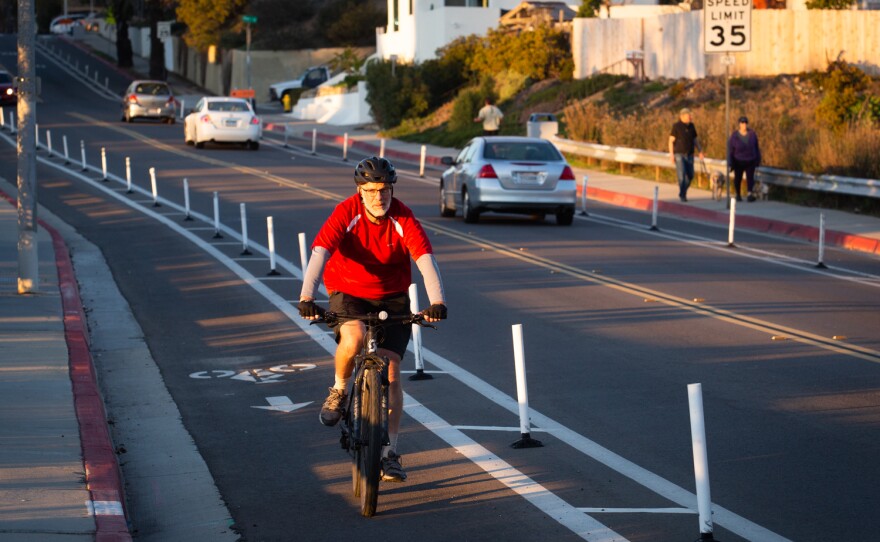A relatively new San Diego nonprofit is set to oversee a $10 million project distributing electric bicycles across the state, but its own local program has struggled with low participation and served participants who made more than the income threshold that officials claim to prioritize.
Launched in 2020, the countywide Pedal Ahead program uses a “loan-to-own” system and is funded by private foundations, public agencies and others. The goal: Offer an alternative to costly cars through what the program calls “socially conscious transportation,” and allow successful participants to ultimately keep their bikes.
“The individuals gain that sense of accomplishment, responsibility, accountability on a number of different levels depending on what they're using the e-bike for,” Pedal Ahead founder Ed Clancy told inewsource. “So, we're seeing a solution-based approach to a common problem.”
Pedal Ahead, operated by a Normal Heights nonprofit under the same name, said close to 400 bikes have been distributed and more than 300,000 miles have been logged. Its San Diego program is “filled” and has a waitlist, according to its website.
But as the program prepares to expand statewide, Clancy said only about 50 local participants have logged enough miles to keep the bikes. And records separately obtained by inewsource show that as of mid-November many users reported far fewer miles than what’s required — or none at all. Some had been inactive for more than a year.
Clancy also acknowledged that while the program claims to prioritize residents who make less than $50,000 annually, not all Pedal Ahead participants meet that threshold. The records show some riders are local government staffers whose public salaries surpass that. Some also have been involved in local transit issues through professional or advocacy work.

The Metropolitan Transit System, which provides bus and trolley services throughout the county with the vast majority of staff salaries surpassing low-income status, confirmed that 20 of its employees participated in the program.
MTS spokesperson Mark Olson said Pedal Ahead approached the agency in October 2020 about participating. Employees were then referred to the program’s application process, he said, and “low-income status was not a condition of participation” at the time.
Those who received bikes included bus operators, train operators, mechanics, management and others, Olson said.
Clancy said Pedal Ahead considers other factors beyond income, including transportation barriers, health and other factors to try to serve more community members. He said 65% of participants earn less than $50,000.
“Prioritization and need has been defined in a few different ways,” he said.
Clancy attributes the challenges to being a startup, but he said the mileage records that inewsource obtained only show a limited snapshot in time and don’t show the program’s efforts to work with participants, most of whom are beginning riders.
As the program grows, he said, officials are learning and implementing better practices. One example: Working with participants who have “peaks and valleys” in their bike use through extensions and mileage plans.”
“We’re going to work with individuals to extend their time and give them that opportunity to earn the bike,” he said.
An e-bike is a bicycle with a battery-powered motor to assist with pedaling. The models used by Pedal Ahead can cost as much as $1,800.
Participants are required to log a daily average of about five miles over two years. Those who don’t meet the mileage requirements still have the option to purchase their bike at a prorated price.
Testimonials on Pedal Ahead’s website include happy riders: One participant said she has used the bike daily to get to work and that the program was “a huge part of my success in leading a healthy and successful lifestyle,” while another said she was riding about three to four times a week.
The program has garnered the support of public agencies. San Diego County has given the program $200,000 in community enhancement grants since 2020, with Supervisor Nathan Fletcher saying last year that Pedal Ahead was “changing lives, and our community.”
Fletcher’s office said Wednesday that it awards hundreds of grants every year under “a rigorous review process” and with written agreements on how the funding will be used.
“We also understand that organizations sometimes endure obstacles that slow the pace of progress, but we should not give up on them,” the supervisor’s statement said. “Pedal Ahead in particular has the potential to help reduce greenhouse gas emissions, provide people with a viable transportation option and inform future transportation decision-making.
“It’s a cause worthy of our support.”
Pedal Ahead also has partnered with the San Diego Association of Governments, which has budgeted about $500,000 over a two-year period toward its own pilot program. SANDAG has slightly different mileage requirements and is leading the participant selection process.
As many as 125 bikes will be available under SANDAG’s program. Riders must live in what the regional planning agency considers a disadvantaged community and provide proof of income. Those who earn more than $50,000 annually will not be accepted, a SANDAG spokesperson said.
The statewide expansion is funded by the legislature’s $10 million allocation for the California Air Resources Board to pay for an e-bike program. Pedal Ahead beat two other applicants to administer the program, with the state citing the “proven, on-the-ground experience” in San Diego.
In a statement to inewsource, an Air Resources Board spokesperson said the agency will design the program and that Pedal Ahead is responsible for implementing it. Officials declined to respond to questions about the program’s low participation in San Diego, saying they “cannot comment on the past perceived success” of a program they did not oversee.
Pedal Ahead is expected to launch its state program in early 2023.







